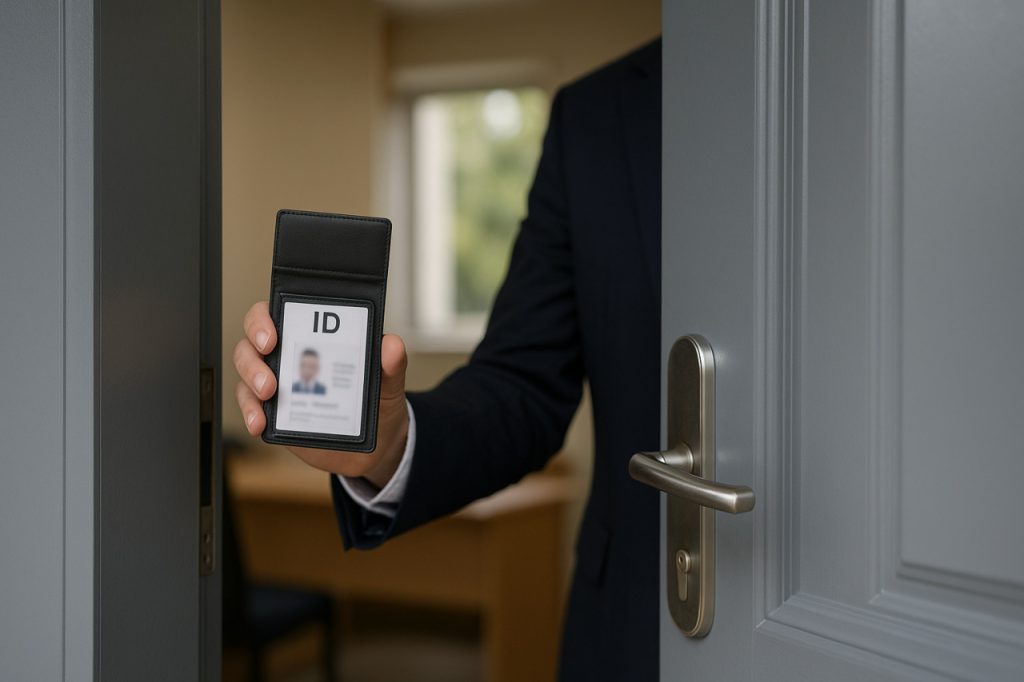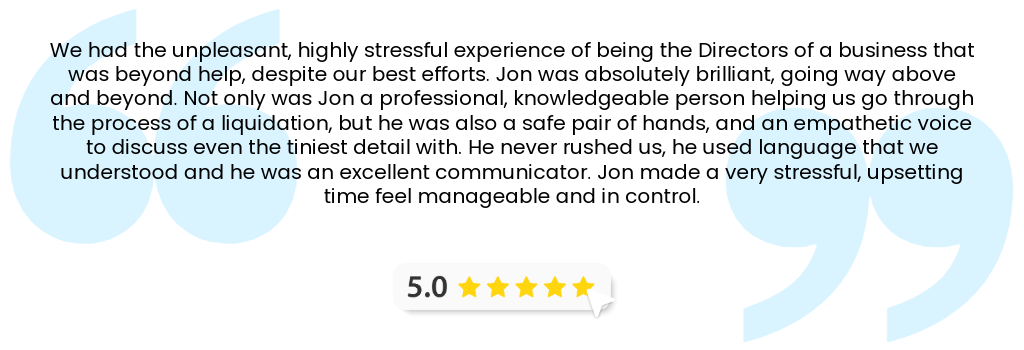HMRC Enforcement Visits And Controlled Goods Agreements: A Director’s Practical Day-Of Checklist
HMRC enforcement agents are at the door, or you have received a Notice of Enforcement and expect a visit. This guide shows what to do in the next 60 minutes, how Controlled Goods Agreements work, and how to protect essential assets while you plan safe next steps.
You will find clear actions, simple definitions, and calm signposting on when to pause and get help. If repayment needs time, consider a Time to Pay arrangement with HMRC or speak with Anderson Brookes for advice.

Who Might Turn Up and Why
You may meet HMRC Field Force officers or certificated enforcement agents acting for HMRC under the Taking Control of Goods regime. First attendances often focus on securing payment or listing goods rather than removal. Always ask to see ID and written authority, then keep a note of names and reference numbers.
Visits usually follow unpaid VAT, PAYE, Corporation Tax or Self Assessment after earlier notices. Before attending, agents typically issue a Notice of Enforcement. The law requires seven clear days between giving notice and taking control of goods. Sundays and bank holidays do not count in that minimum.
Rights of Entry
Entry should be peaceful and through normal access during reasonable hours. Agents should show relevant identification and documents when asked. Keep your tone calm and factual.
If entry is made, agents can list goods with resale value that belong to the debtor. Certain items have protections, including tools of the trade and basic domestic needs. These rules sit within the Taking Control of Goods Regulations 2013 and Schedule 12 to the Tribunals, Courts and Enforcement Act 2007.
If you want more detail, read our guide to bailiffs and enforcement officers.
Controlled Goods Agreements: What You Are Agreeing To
A Controlled Goods Agreement (CGA) is a short written document that lists specific items and sets payment terms. Once signed, the listed goods stay on site but are legally under control, and you must not move or sell them. A valid CGA must be in writing and signed by the enforcement agent and the debtor, or by someone authorised or apparently authorised at the premises. Only sign terms you can keep.
If you’re not sure if you can afford the repayments, say so. Ask for time to confirm figures and to take advice. It is safer to pause than to commit to instalments that are likely to fail.
What Directors Need to Do on the Day: Immediate Actions
Stay calm. Speak clearly. Keep records. The aim is to protect the business while you agree safe next steps.
- Check authority at the door
Ask to see photo ID and written authority. Note names and reference numbers. Confirm the Notice of Enforcement timelines if the notice is recent. - Create a simple record
Start a note with date and time, who attended, documents shown, and anything you agreed. Photograph paperwork and any inventory list. - Keep entry and listing within the rules
Entry should be peaceful. If an inventory is prepared, check it line by line. Flag leased, financed, or third-party goods and provide proof where possible. - Treat a CGA with care
A CGA must be written and properly signed. Goods listed remain under control. - Check cash and propose only what you can sustain
Confirm today’s balance, near-term incomings and outgoings, and any essential spending. If a short plan is viable, set it out plainly. If arrears are larger, consider a Time to Pay arrangement instead of forcing an unaffordable CGA. - Involve a licensed insolvency practitioner early
If the numbers do not work, call us. We can sense-check affordability the same day, explain options in plain English, and help you make a safe plan before you sign anything.

Preparing Essential Documentation
Being organised buys you time and shows good faith. Keep a small “enforcement pack” ready so you can produce documents quickly on the day.
- Identification and authority checks: your Notice of Enforcement, plus photographs of ID and written authority shown at the door.
- Finance snapshot: today’s bank balance, payments due in and out for the next 14 days, and a one-page management view of cash flow. This supports any proposal or a Time to Pay request.
- Proof of ownership and exemptions: invoices, finance schedules, and leases for vehicles, machinery or IT; a short list of tools essential for trading. These help you prevent protected or third-party assets being listed.
- Tax and HMRC correspondence: the latest VAT return, PAYE RTI summary, Corporation Tax statement, and copies of any payment proposals. Keep the envelope if you still have it, to confirm service and dates.

When documents are requested, provide what is relevant and accurate. Avoid speculation. Ask for a copy of any inventory. If a CGA is proposed, read it slowly and only agree terms you can honour.
Immediate Next Steps
Keep promises small and realistic. If you can make a modest upfront payment today and a few affordable instalments, set it out clearly. If that would jeopardise trading, say so and ask for time to verify figures and discuss alternatives.
Where there is a credible route to catch up over time, a structured Time to Pay arrangement can create breathing room and show good faith. We help directors prepare figures and present a proposal that HMRC can assess.
For a wider view of pressure points, escalation, and options, our HMRC debt management guide explains next moves in plain English.
Red Flags

- Preferential payments to connected parties or one creditor at the expense of others if the company is insolvent. This can increase risk later if enforcement escalates or a winding up follows. If you are worried about personal exposure, our article on Personal Liability Notices explains HMRC’s approach to certain debts such as NIC.
- Moving or disposing of controlled goods. Once goods are listed or under control, keep them in place. Breach allows re-entry and removal following set procedures.
- Unaffordable promises. Do not sign a CGA you cannot keep. Ask for time to confirm figures or to discuss Time to Pay.
Sectors We Support
We support company directors in every sector, from construction firms and logistics companies to pubs, cafés, restaurants, hotels, retailers and manufacturers. Our advice is always clear, confidential and shaped by real experience in your industry. Whether you’re dealing with unpaid tax, supplier pressure or falling income, our team understands the challenges and will guide you through the best next steps.
Legal Rights and Obligations
You have the right to ask for ID, written authority, and relevant documents. Agents should act professionally and produce documents when requested. Keep notes of names and reference numbers.
You also have obligations once a valid notice has been served. Allow peaceful entry at reasonable times. Provide accurate information that is requested and relevant. Do not obstruct, and do not interfere with controlled goods. If payments are missed under a CGA, agents can return to remove listed items for sale, following set procedures.
If you receive a statutory demand or a winding-up petition threat, timelines get tight. Our director’s guide to winding-up petitions explains what to expect and what to do next.
What to Do After the Visit
When the door closes, take ten minutes to get organised.
- Review any Controlled Goods Agreement
Check every item, ownership status, and dates. Keep a clean copy. Missing a payment allows re-entry and removal of listed goods. - Secure proofs
File digital copies of invoices and finance agreements for key assets in case there are queries later. - Update your cash view
If a short plan is realistic, diarise instalments and remind yourself before each date. If not, consider Time to Pay and take advice. - Brief stakeholders
Send a factual note to fellow directors and your accountant: who attended, what was listed, whether a CGA was signed, and the payment dates. - Watch for escalation signs
If you receive a statutory demand or a winding-up petition threat, time gets short. Formal action has strict timelines and serious consequences if ignored. - Ask for regulated advice
If repayments would starve the business of cash, or arrears are multi-tax, speak to a licensed insolvency practitioner. We will explain rescue or closure options, and how formal steps can pause enforcement and reduce risk.
Closing a Limited Company with Debts?
Anderson Brookes Insolvency Practitioners help directors close limited companies with debt quickly, legally and with expert guidance every step of the way.
Contact us today
Common Mistakes to Avoid
Stress makes quick decisions harder. These are the slips we see most often during an HMRC enforcement visit, plus safer actions you can take on the day.
Ignoring the Notice of Enforcement
The notice usually gives you seven clear days before agents can take control of goods. Use that time to check cash, gather proofs of ownership, and get advice.
Instead: prepare a simple cash snapshot, assemble key documents, and decide whether a short plan or Time to Pay is realistic.
Signing an Unaffordable CGA
A Controlled Goods Agreement is binding. Missed payments allow re-entry and removal of listed goods.
Instead: ask for time to verify figures. Only agree to instalments you can sustain. If you need longer, explore Time to Pay.
Letting Protected or Third-Party Goods Be Listed
Leased assets, financed items, tools of the trade and third-party property can be wrongly included if you do not speak up.
Instead: check the inventory line by line and show proof of title or finance there and then. Ask for a copy before anyone leaves.
Moving or Disposing of Controlled Goods
Once goods are under control, moving or selling them risks immediate removal and extra costs.
Instead: keep items in place, stay compliant, and focus your energy on negotiating terms you can keep.
Overexplaining or Guessing
Saying too much or speculating can create confusion and commitments you did not intend.
Instead: answer what is asked, accurately and briefly. Keep notes of questions and answers. If unsure, say you will check and come back.
Waiting Too Long to Get Advice
Delays reduce your options and can turn a manageable situation into crisis.
Instead: involve a licensed insolvency practitioner early if the CGA looks tight, arrears span multiple taxes, or cash flow is fragile.
Stay calm, record everything, and only commit to what you can deliver. If affordability is uncertain, pause and get advice before you sign.
Frequently Asked Questions
During an HMRC enforcement visit, you need to know what documents to provide, what rights you hold, and how to respond if goods are taken under control. Preparation, clear record-keeping, and awareness of the consequences of breaching agreements are essential to protect your company.
What essential documents should a director have on hand during an HMRC enforcement visit?
You should have recent financial statements, tax correspondence, and proof of payments available. Keep company registration details, contracts, and asset ownership records accessible to avoid delays. Having these documents ready allows you to demonstrate compliance and clarify any disputed amounts.
How can a company prepare for a Controlled Goods Agreement prior to an enforcement officer’s arrival?
Ensure your accounts are up to date and that you know which assets belong to the company. Identify essential goods required for trading, as these may be exempt from seizure. Keep a clear record of outstanding debts and communications with HMRC.
What are the legal rights of a business during an HMRC enforcement visit?
You have the right to receive a Notice of Enforcement before an officer attends. Officers can only take control of goods that belong to the business and are not exempt under the regulations. You may request identification and a clear explanation of the debt being enforced.
What immediate actions should a director take if goods are seized during an enforcement visit?
Request a full inventory of the goods listed in the Controlled Goods Agreement. Confirm whether the goods are essential for business operations or subject to exemption. Keep a copy of all documents signed during the visit for your records.
How can a director dispute the findings of an HMRC enforcement visit?
You can raise a formal complaint with HMRC if you believe the enforcement action was incorrect. If necessary, you may apply to the court to challenge the seizure of goods or the validity of the enforcement process. Legal advice should be sought promptly to support your position.
What are the potential consequences for a company if a Controlled Goods Agreement is breached?
If you fail to comply with the terms of a Controlled Goods Agreement, enforcement officers may remove and sell the listed goods. This can disrupt business operations and reduce the value of assets available to the company. Continued non-compliance may also escalate enforcement measures and increase costs.

Need advice now?
Before you sign anything today, speak to a licensed insolvency practitioner for calm, regulated advice. We can help you assess affordability, structure a Time to Pay proposal, or explain formal options if needed.
